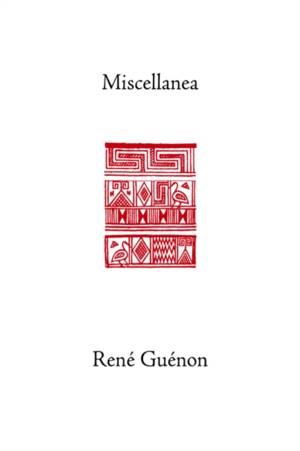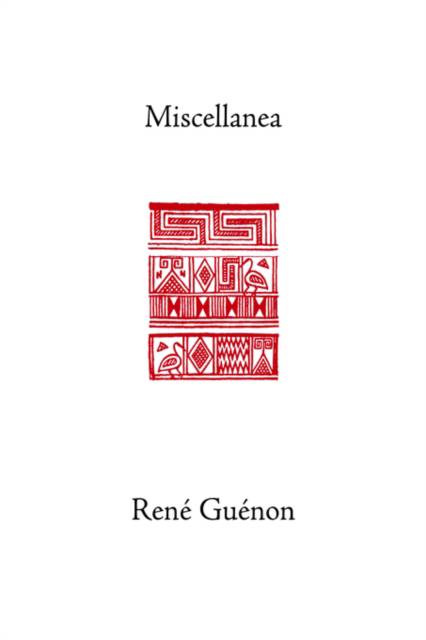
- Afhalen na 1 uur in een winkel met voorraad
- Gratis thuislevering in België vanaf € 30
- Ruim aanbod met 7 miljoen producten
- Afhalen na 1 uur in een winkel met voorraad
- Gratis thuislevering in België vanaf € 30
- Ruim aanbod met 7 miljoen producten
Omschrijving
To spare readers extended research into obscure back issues of French journals long out of print, Miscellanea gathers together for Anglophone readers various articles by René Guénon, and by 'Palingenius', his pseudonym during the time of La Gnose, a journal he founded in 1909. These articles have been divided into three categories: Metaphysics and Cosmology, Traditional Arts and Sciences, and Some Modern Errors. From the first chapter of part one, 'The Demiurge', which we believe is the first text he ever submitted for publication (in 1909, at the age of twenty-three) to 'Profane Science in Light of Traditional Doctrines', of April-May 1950, more than forty years elapsed. The breadth of the topics covered can be seen from a sampling of chapter titles: Monotheism and Angelology; Spirit and Intellect; Silence and Solitude; The Empiricism of the Ancients; Gnosis and the Spiritist Schools; The Origins of Mormonism, On the Production of Numbers; Initiation and the Crafts; and The Arts and their Traditional Conception. In the latter two key chapters, the author explains how initiation became necessary in the measure that humanity receded from the 'primordial state', presenting the reasons for the degeneration of the arts and crafts due to the 'fall' or descending trajectory of the present cycle; but he also points out the possibility of an initiation into the 'lesser mysteries' based upon the craft of building which still exists validly in the West.
What is here presented as a miscellany of essays would in the case of most other writers on metaphysical subjects be considered a major work, both in breadth and depth. Some claim that Guénon's views never "developed," that his knowledge of metaphysics was innate-as primordial and unchangeable as truth itself. Though clearly an exaggeration (for example, A.K. Coomaraswamy and Marco Pallis led Guénon to considerably revise his views Buddhism), there is still a remarkable degree of truth to this claim. Information must be acquired, and in the process erroneous notions will be corrected; yet the capacity for intellective insight is not an acquisition, but a gift; it is developed not by adding something but by removing a veil. Some of the essays collected in this text could be considered Guénon's "juvenalia," yet the unerring instinct for metaphysical truth is already there, fully formed, along with the first stirrings of the author's lifelong preoccupation with initiatic spirituality, the cosmological sciences, and the errors of modernity; there is no real incompatibility of outlook here between the Guénon of 1909 and the Guénon of 1950. Far from being a mere collection of fugitive writings, Miscellanea is an important work in its own right, worthy of its own unique place in the Guénonian corpus.
Specificaties
Betrokkenen
- Auteur(s):
- Vertaler(s):
- Uitgeverij:
Inhoud
- Aantal bladzijden:
- 216
- Taal:
- Engels
- Reeks:
Eigenschappen
- Productcode (EAN):
- 9780900588563
- Verschijningsdatum:
- 23/05/2004
- Uitvoering:
- Hardcover
- Formaat:
- Ongenaaid / garenloos gebonden
- Afmetingen:
- 166 mm x 236 mm
- Gewicht:
- 526 g

Alleen bij Standaard Boekhandel
Beoordelingen
We publiceren alleen reviews die voldoen aan de voorwaarden voor reviews. Bekijk onze voorwaarden voor reviews.







